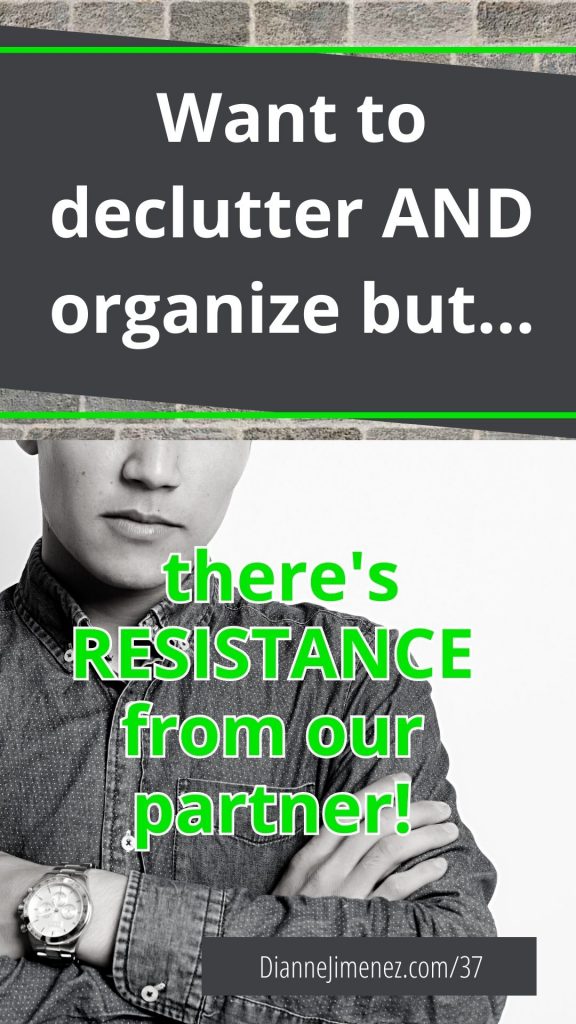How To Minimize Resistance From Our Partners Before Decluttering
EPISODE 37

by Dianne Jimenez
This article takes 13 minutes to read
Don’t have time to read this? Listen to the podcast episode instead:
Subscribe to the
PARENTING GUIDE: ORGANIZING HABITS MADE EASY PODCAST
and never miss a bonus episode!
How To Minimize Resistance From Our Partners Before Decluttering
This episode takes you through the 4 key criteria to have in a conversation with your partner to minimize their resistance relating to any decluttering or organizing project. I discuss setting clear goals all while considering everyone’s feelings, thoughts and mindset.
I hope this helps you with your organizing journey. Enjoy and let me know what you think!
Here’s a glance at this episode:
[01:37] – The first thing to do before starting a decluttering or organizing project is this
[04:24] – The 2nd criteria of the conversation is patience, and not just for them
[05:14] – There’s more to being specific. The last one is the most important
[9:45] – What to do if they really don’t want to make any changes
[13:52] – About being supportive & understanding
Want to go from 'drowning' to peace of mind?
Today’s podcast episode is another good one because it’s touching on the topic of resistance and what we can do to avoid it or minimize resistance. Now, I’m not talking about the kids because yeah, they too can be resistant to any change or to do extra chores. But what happens if the resistance comes from our partner? More specifically, it’s resistance to any change, like any decluttering or organizing activity that’s about to happen? Just so you know, it’s totally normal that you might come up with a little resistance, or a lot, when it comes to decluttering and organizing.
In this episode we’re going to talk about what to do before decluttering or even organizing to avoid, or reduce, the amount of resistance that could happen with any kind of change happening in the house. So, are you ready? Let’s do this!
#37: How to Minimize Resistance From Our Partners Before Decluttering
Whenever we want to do a decluttering or organizing project, my client and I, (or even myself, because this has happened in the past), are usually in the mindset of getting stuff done. Now I understand this completely because we’re so eager to get things going and make changes. But there is something we have to do first and foremost, before we even start taking action to minimize resistance and that is to communicate. And why do I say this?
1. Minimize Resistance by
COMMUNICATING
Because it’s happened where the partner is often a little upset that we’re taking on this project where we’re getting our hands in things that they may not be ready to let go of just yet. Or maybe, they’re not ready to move around and then have to adjust the way they go about in the house such as their habits, where they move things or where they have to find things now. No doubt, it’s a big adjustment for not only them, but for anybody who is suddenly faced with change. And it’s normal.
So there are two main reasons why you need to communicate first before you even start taking action on decluttering or organizing; Especially when it’s a common space or even a space that has mostly their things in it.
Why there’s resistance
First of all, you’ve been simmering this idea in your head for a lot longer than your partner has. It could be weeks, months, or even years, that this whole idea or something has been planted in your head and simmering in there.
find out how families with 3+ kids tackle the beast: laundry!
Whereas your partner is experiencing this for the first time. Therefore, they’re not in the same head space, or even pace, as you. And oftentimes your partner may not see a reason for the change to happen. Therefore seeing that you’re about to make a change in your home, well, it kind of gets them a little antsy or apprehensive. Because, what does this all mean for them? What do they have to do extra? Does this also mean that they have to help out? Also, does this have to mean that they have to change some of their habits? Like, who wants to do that?
So don’t be surprised if you get a little bit of resistance or a little bit of a pushback from them. Understandably, they need to process all of this and may not share your enthusiasm or understand your goals just yet. This is why it’s important to communicate and have a conversation before starting your organizing or decluttering project to minimize resistance.
But I’ll talk about more of that in just a bit.
2. Minimize Resistance by
BEING PATIENT
The next thing you have to do is be patient. Again, they have to process all of this and it’s all coming in so fast. No doubt, you’re excited. You want change to happen. Or, you could be the total opposite of this (excitement) and give off feelings of frustration or annoyance. So either way, you’re coming in hot with all of this information and motivation.
My advice is to slow down a little and give them that space and time to help minimize resistance. This is why patience is the second thing you have to do before decluttering and organizing. Be patient with them as well as yourself.
Alright, I get it. You’re excited and you want to get this project up and running. I hear you my friend, I hear you. Therefore, if you want to quicken the process, but gently, we need to do the next thing.
3. Minimize Resistance by
BEING SPECIFIC
And that’s number 3: Be specific. But there are many parts to being specific that I’ll be going through each of them with you to help minimize resistance..
Specific about: WHEN
The first part of being specific is explaining the ‘when’. When do you plan on doing this whole project?
If your partner’s on board or already good to go, then set that date and set it in your calendar. Sync up your phones so you’re both aware of when this is all taking place.
My Secret Sauce for setting the kids up for success
Specific about: HOW LONG
Next thing about being specific is ‘how long’, approximately, will you be working on this project? Now, sometimes it’s hard to say or guesstimate how long a project will be going on for, because there are so many factors to consider here. For example, there’s the speed of decision making. Then there’s making sure that you have everything lined up so that you can keep moving forward. And another is, life happens.
So it’s really tough sometimes (to really know how long a project will take). Even as a professional organizer, clients do ask how long it takes to organize such and such space. So instead of focusing on the whole thing, try to be a little bit more specific on how long you’ll be working during this project. Is it a half an hour? Is it half a day? If the latter, which days are these exactly? Will it be a couple of hours every single day after work this week and going into the next?
So giving that kind of frequency will give your partner a good idea of when you’re not available. Because remember that apprehension that I was talking about earlier about what this all entails for them and how it’ll affect their life? Well, they just need a clear picture of when you won’t be available. But also to make clear if they’re needed in this whole project. But I’ll get to that in a bit.
Bottom line for being specific on ‘how long’ is so your partner can just wrap their head around and make sure that it makes sense in the schedule.
Specific about: NEEDING HELP (OR NOT)
The next thing about being specific is, like I just said, is: what do you need help with? That’s back to whether or not your partner is needed or how involved they need to be in this whole project.
So this is an important part of the conversation where you’re actually open and honest about what it is that you want from them. Where are you needing assistance? What type of assistance? What type of information do you need from them? And how much assistance do you need? Maybe it’s none at all…
Specific about: WHERE
Naturally, the next part of the conversation and communication with your partner about being specific is talking to them about ‘where’. Like, the space that you’ll be working on.
Now, typically you wouldn’t be discussing things if this was all about organizing your own things. These are things that don’t have anything, really, to do with your partner, right? It’s more of the common areas or the spaces that contain some, or most, of your partner’s items. For this reason, this conversation is extremely important in order to avoid any resistance before you get to declutter or organize anything.
3 things to establish now before losing your s#!t later on (during the school year)
Specific about: WHAT
Speaking of ‘things’, we’re getting to the next point of the conversation that you need to be specific about: what exactly are you decluttering or organizing? Ugh, this is where the hotspot is. So if you get to this point and you still feel a resistance or you still feel that pushback from them, it might be a good time to revise your initial project and maybe move on to something that has less pushback.
For instance, your whole goal was to say, get rid of most of your partner’s collections of something, whatever it is, that they haven’t even touched in years. Well, if that has a lot of emotional attachment for them and they’re expressing this in many ways that you know that you haven’t heard before, maybe step back from that. It’s still a very sensitive topic for them, or it’s something that holds a lot of emotion. And we all know this when we’re emotionally involved, it’s really hard to let go of things or even to move things around. Therefore, let’s pay close attention to that and let’s be a little bit more sensitive by putting ourselves in their place too.
Decluttering neutral areas first, has potential benefits when you want to minimize resistance
A great place to maybe start, is somewhere else, like a more common area where there isn’t much of their things in it. In other words, something that’s kind of like a neutral ground. For example, it could be decluttering or organizing the kids’ things, the bathroom items or the linen closet. Staying away from very sensitive topics or hotspots right now is a good idea, but it doesn’t mean that you can’t revisit them later. You just have to shift your project to another focus area.
And hopefully, because of this, your partner can see the benefits of the changes that have been made from decluttering or reorganizing that space. And maybe, with time, will participate and see how this whole process can be easy or a lot smoother when more people are involved in helping out. Another area that you can try is maybe working on your own items in your own space. Because the benefit here is you’ll lead by example; and where one leads others will follow, especially if there’s a positive outcome, right?
An example of such benefits are: having more time or you’re less stressed, it’s easier to find your things and put them away, and you feel lighter, etc. There are many benefits from decluttering alone. You never know, they may just turn around and start to declutter or minimize their own areas or items themselves.
Free training: "How to find time in a busy schedule"
If this does happen, maybe at this point ask them if they need any help with their things. Why not? You are now the pro because you’ve done this before.
Specific about: WHY
The last thing we’re going to talk about in this specific area is the ‘why’. People need reasons, beliefs, and even some perspective before considering jumping on board for anything. So this is the reason why it’s so important if they’re not on board (right away) to give a reason why.
It’s not asking for permission. Minimize resistance by getting on the same page
Now, just to be clear here, this whole thing is not to ask permission from the person. No, not at all. It’s actually to get them on the same page as you. And so to help them wrap their heads around this whole project that potentially can alter or change the way they live around the house (or even their habits), they need to have some reasons, see the bigger picture and have all the details laid out.
So this is what this whole conversation is about: Going back to being specific about the ‘why’. Why does this project need to happen? Why is this whole thing making you annoyed? Or why are you excited about taking on this decluttering and organizing project? Hence, when you explain it, just give it to them straight: in black and white. There’s no ho-hum story or bells and whistles.
What is it that you want to achieve in the end? Is decluttering and organizing that space going to make your life a lot better? Will it help you reduce stress? Is it going to get you out of the house a lot faster? Is it going to get the kids to move a lot faster before school? Are things constantly in the way of getting basic stuff done? Or it can also be that you want to make sure tidying is simple and quick for everyone and that it doesn’t have to fall on you all the time (yeah, I had to add that too).
In essence, you have to get the house organized so that everything has a home finally. And it starts with decluttering, which involves getting rid of the excess sometimes. Can you see this may cause some concern for them? Help them minimize the resistance by being…
Stay on track with laundry & tips to getting the kids involved
Being honest and vulnerable: it’s often the key to opening their mind and minimize resistance
So if they’re not on board, it’ll be a long and tough road with a lot of resentment. And you know that’s just not good on anyone’s spirit. If there’s anything about this podcast episode that you want to take away: make sure this is it, this part of your conversation. Everything else is kind of secondary. The ‘why’ explains the way you see things. What’s the real reason for wanting to move things around the house? How does (the house) make you feel? If it isn’t keeping you at peace and the way things are organized around the house is just not making you happy, this needs to be expressed. And just by being honest and vulnerable, your partner may even open up too, about their thoughts and feelings about this whole project.
4. Minimize Resistance by
BEING SUPPORTIVE & UNDERSTANDING
Finally, number four of what to do before decluttering or organizing, is to be supportive and understanding. More specifically, both of you need to be supportive and understanding towards each other. This isn’t an easy conversation sometimes, so take your time and know this can be more than one conversation. Meaning, there can be some follow up conversations about it too. Like organizing, it’s not always a one-and-done thing.
So I hope you liked this episode. I (also) hope it’s going to give you some direction, a bit of guidance, and you got some takeaways from it all. Please know, this whole thing is to help you, arm you with the words, perspective and mindset to have when you do decide to declutter or organize your home. It’s important to consider other people are involved here (in the change that’s about to happen), even though they’re probably not going to be physically involved in doing the tasks. But I hope they are. And if they’re not, they still need to get a heads up. So I hope this episode helped you minimize the resistance in decluttering and organizing your home.
Thank you and please share this episode with a friend!
All right, my friends, thank you so much once again for being here and being a constant listener to my podcast. I truly, truly appreciate it. Now, if you can, I would love your review on Apple Podcasts or even subscribe to it. The more people follow, subscribe or even rate it, Apple will recognize it as an important podcast and boost it up in the algorithm. Therefore, getting my podcast in front of people who probably need to hear these episodes. So I thank you in advance for that. All right, have a great week and I’ll see you next time. Bye-bye.

Referenced in this episode
Can you think of someone who would also benefit from reading this?
Send it to them:

